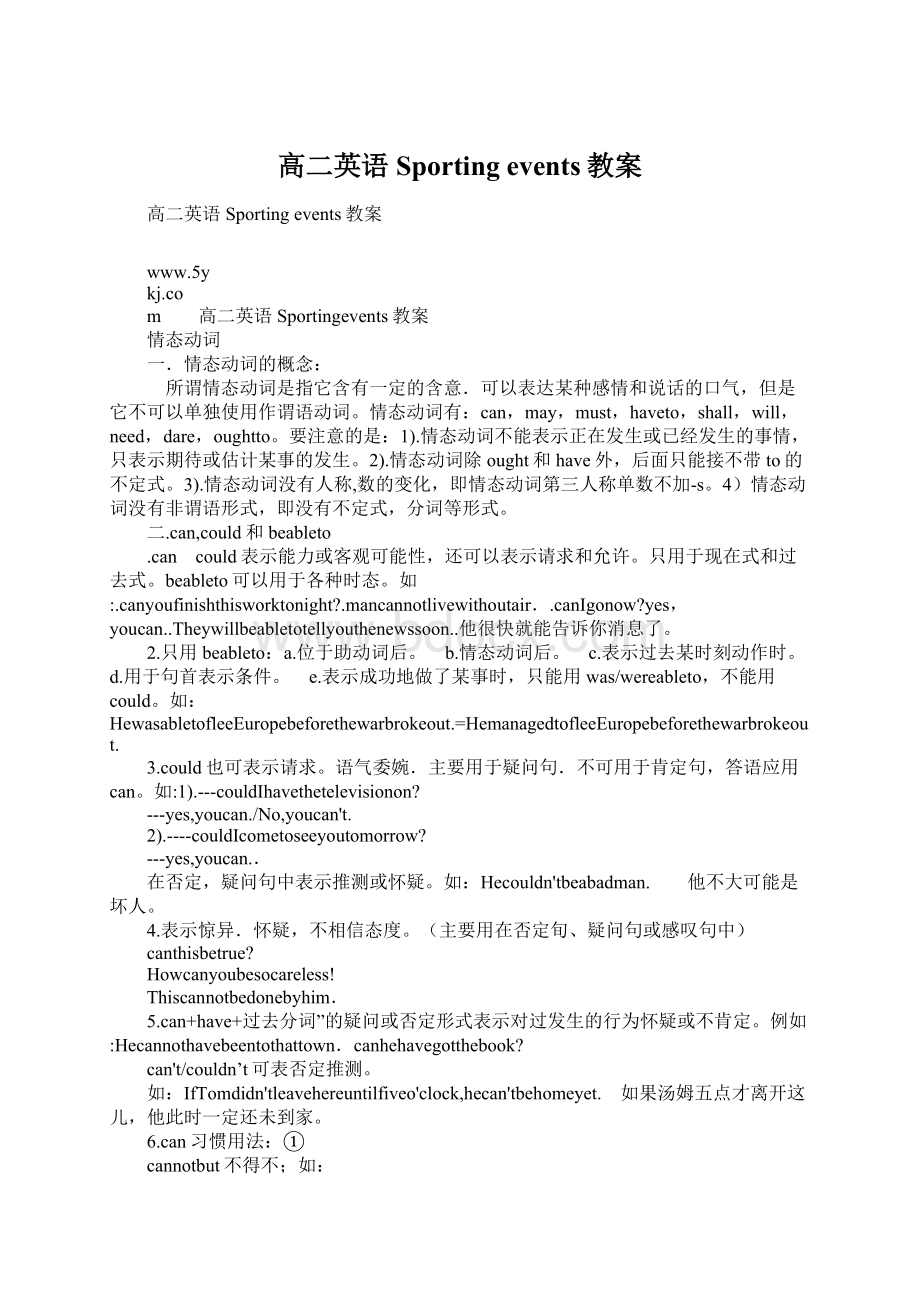高二英语Sporting events教案文档格式.docx
《高二英语Sporting events教案文档格式.docx》由会员分享,可在线阅读,更多相关《高二英语Sporting events教案文档格式.docx(9页珍藏版)》请在冰豆网上搜索。

beableto可以用于各种时态。
如:
.canyoufinishthisworktonight?
.mancannotlivewithoutair..canIgonow?
yes,youcan..Theywillbeabletotellyouthenewssoon..他很快就能告诉你消息了。
2.只用beableto:
a.位于助动词后。
b.情态动词后。
c.表示过去某时刻动作时。
d.用于句首表示条件。
e.表示成功地做了某事时,只能用was/wereableto,不能用could。
如:
HewasabletofleeEuropebeforethewarbrokeout.=HemanagedtofleeEuropebeforethewarbrokeout.
3.could也可表示请求。
语气委婉.主要用于疑问句.不可用于肯定句,答语应用can。
1).---couldIhavethetelevisionon?
---yes,youcan./No,youcan'
t.
2).----couldIcometoseeyoutomorrow?
---yes,youcan..
在否定,疑问句中表示推测或怀疑。
Hecouldn'
tbeabadman. 他不大可能是坏人。
4.表示惊异.怀疑,不相信态度。
(主要用在否定旬、疑问句或感叹句中)
canthisbetrue?
Howcanyoubesocareless!
Thiscannotbedonebyhim.
5.can+have+过去分词”的疑问或否定形式表示对过发生的行为怀疑或不肯定。
例如:
Hecannothavebeentothattown.canhehavegotthebook?
can'
t/couldn’t可表否定推测。
如:
IfTomdidn'
tleavehereuntilfiveo'
clock,hecan'
tbehomeyet. 如果汤姆五点才离开这儿,他此时一定还未到家。
6.can习惯用法:
①
cannotbut不得不;
Icannotbutadmirehiscourage.我不得不佩服他的勇气。
②cannothelp+doing情不自禁;
whenIheardwhatthelittlegirlsaidIcouldn’thelplaughing.当我听见小女孩所讲的,不禁大笑起来。
③canbut只好,不得不;
wecanbutagreewithhim.我们只好同意他。
④cannot...too...怎么……也不过分;
youcannotbetoocarefulinthechoiceofyourfriends.你在选择朋友时,怎么小心也不过分。
三.may和might
.表示许可。
表示请求、允许时,might比may的语气更委婉一些,否定回答时要用mustn’t表示“不可以”、“禁止”、“阻止”之意。
例如:
youmaydrivethecar.mightIuseyourpen?
No,youmustn’t.
2.表示推测、可能
Hemaybeverybusynow.
3.用于析使句中表示祝愿。
mayyousucceed!
4.表示请求或规劝。
youmightpaymoreattentiontome.
5.“may+have+过去分词”表示对过去发生的行为的推测。
Hemaynothavefinishedthework.
6.may/might的其他用法:
①maynot表示一种礼貌的“不可”。
youmaynotleavethethinghalfdone.
②.might可表示忠告,责备。
yonhavebrokentwodishes.youmighttrytobemorecareful.
③.maywell+原形,理所当然
youmaywellsayso.你当然可以这样讲。
④.may/mightaswell=hadbetter最好
wemayaswellstaywhereweare.我们最好是留在原处。
Ifthatisthecase,wemayaswelltry.
⑤.may/mightaswell+原形+as+原形
与其……不如;
最好……不要;
youmightaswellthrowyourmoneyawayaslendittohim.你要借给他钱,不如把钱扔了。
Peter___comewithustonight,butheisn'
tverysureyet.
A.must B.may c.can D.will
四。
haveto和must
.must表示必须,强调的是一种主观看法。
也表示责任或义务.而haveto表示必须时强调的是客观需要。
haveto可以用在更多的时态中。
mybrotherwasveryill,soIhadtocallthedoctorinthemiddleofthenight. 我弟弟病得很厉害,我只得半夜里把医生请来。
Hesaidthattheymustworkhard.他说他们必须努力工作.(主观上要做这件事)
youmustobeytherules.
youwillhavetodoitagain.你将不得不再做一次。
回答must引出的问句时.如果是否定的回答.不能用mustn’t.而要用needn’t或don’thaveto。
mustwehandinourexercisebookstoday?
yes.youmust.
2.“mustbe+表语”的结构表示推测。
它的否定或疑问形式用can代替must。
Thismustbeyourpen.
3.must+have+过去分词”的结构常用在肯定句中.表示对过去发生的行为的推测。
HemusthavebeentoShanghai.
4.must一般只表现在,have则有更多的时态形式。
5.二者的否定意义不大相同.mustn’t表“禁止”,don’thaveto表没有必要。
yonmustn’tgo.你可不要去。
youdon’thavetogo.你不必去。
6.询问对方的意愿时应用must。
mustIcleanalltheroom?
五.will和would
.表示请求、建议等,would比will委婉客气.wouldyoupassmethesalt?
2.表示意志、愿望和决心。
Iwillneverdothatagain.
Theyaskedusifwewoulddothatagain.
3.表示习惯动作。
Fishwilldiewithoutwater.
4.表示预言。
oilwillfloatonwater.
5.用“willbe”和“will十have十过去分词”的结构表示推测,主要用于第二、三人称。
前者表示对目前情况的推测,后者表示对已经完成的动作或事态的推测。
Thiswillbethebookyouwant.
Hewillhavearrivedbynow.
6.would可表示过去反复发生的动作或某种倾向。
would表过去习惯时比usedto正式。
并没有“现已无此习惯”的含义。
Thewoundwouldnotheal.
Duringthevacationhewouldvisitmeeveryweek.
7.表料想或猜想。
Itwouldbeabouttenwhenhelefthome.
whatwouldshebedoingthere?
Ithoughthewouldhavetoldyouallaboutit.
8.wouldlike;
wouldliketodo=wantto想要,为固定搭配。
wouldyouliketogowithme?
9.willyou…?
wouldyoulike…?
表示肯定含义的请求劝说时,疑问句中一般用some,而不是any。
wouldyoulikesomecake?
0.否定结构中用will,一般不用would,won'
tyou是一种委婉语气。
won'
tyousitdown?
六.Shall,
should和oughtto
.shall用于第一人称表示征求对方的意见:
whatshallwedonext?
2.shall用于第一、第三人称疑问句中.表示说话人征求对方的意见或向对方请示。
Shallwebeginourmeeting?
whenshallweleavethehospital?
3.shall用于第二、第三人称,表示说话人给对方的命令、警告、允诺或威胁。
youshallfailifyoudon’tworkharder.;
HeshallhaveabookwhenIfinishreading;
Heshallbepunished.
4.表示推测或可能。
Theyshouldfinishtheworkbynow.
5.should表示劝告、义务、建议、命令,其同义词是oughtto;
在疑问句中。
通常用should代替oughtto。
weshouldlearnsomeEnglish.
youshouldgotoclassrightaway.
ShouldIopenthewindow?
注意:
should的含义较多,用法灵活。
现介绍三种其特殊用法。
请看下面句子:
Ishouldthinkitwouldbebettertotryitagain.我倒是认为最好再试一试。
youaremistaken.Ishouldsay.依我看,你是搞错了。
Ishouldadviseyounottodothat我倒是劝你别这样做。
ThisissomethingIshouldhavelikedtoaskyou.这是我本来想问你的。
从以上例句可以看出:
情态动词should用于第一人称时可以表示说话人的一种谦逊、客气、委婉的语气。
此外,why/How_+should结构表示说话人对某事不能理解,感到以外、赞叹、愤怒、惊异等感情,意思为“竟会”。
whyshouldyoubesolatetoday?
你今天怎么来这么晚?
--whereisBet